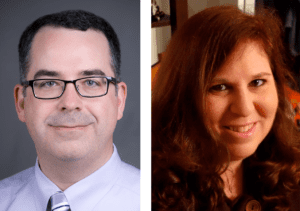As part of its strategic plan, ASHG’s Professional Practice and Social Implications (PPSI) Committee is tasked with helping ASHG members and the research community advance genetics and genomics in ways that integrate and embed societal impacts within research goals and practices. In the first of a series of resources, ASHG published a new Guidance on responsible practices when conducting ancient DNA research.
 PPSI Co-chairs, Kyle Brothers, MD, PhD, and Sarah Tishkoff, PhD shared their insights on the importance of addressing ethical, legal and social implications (ELSI) of genetics and genomics research.
PPSI Co-chairs, Kyle Brothers, MD, PhD, and Sarah Tishkoff, PhD shared their insights on the importance of addressing ethical, legal and social implications (ELSI) of genetics and genomics research.
ASHG’s vision is for people everywhere to realize the benefits of human genetics and genomics research. How do you see the PPSI Committee’s charge and activities fitting in with that vision?
When we attend to the ethical, legal, and social implications of our science, we maximize the chances that individuals and populations everywhere will benefit, and decrease the chances that harm will result. The PPSI is focused on providing direction for ASHG members and the broader scientific community on how to address these ELSI issues in their work.
Why is it important for researchers to be aware of the broader societal impacts of their science?
One way or the other, genetic and genomic science is mostly about helping people. Sometimes our science is explicitly designed to improve health, and sometimes the benefits are more open-ended, like the benefits of understanding our ancestry. Either way, genetic and genomic science is inherently outward looking: our science is meant to have meaning in the world. In order to fulfill this vision, it is important to anticipate the effect our science will have in the world and plan how to maximize that benefit.
ASHG has launched ASHG Guidances to help ASHG members and other researchers grapple with ethical and social issues they might face. How can these guidances help genetics and genomics researchers?
We recognize that ASHG members and other research professionals want to do the right thing when tackling complicated ethical issues regarding genetics and genomics research. Sometimes, however, it is not clear how best to achieve that goal. The complexity of these issues can be enormous, and scientists often have limited time to research these issues and develop the necessary expertise. ASHG Guidances are designed to provide clear expert counsel on how to address these complex issues, reflecting the current understanding of best practices. Guidances are rarely prescriptive, but are designed to help ASHG members and other research professionals operationalize current best practices in the context of their work.
What ELSI issues do you think are the most challenging for genetics and genomics researchers today? In the next 5 years?
Throughout its history, the field of genetics has had a complex, and at times troubling, relationship with the culturally constructed concept of race. There is now a broad consensus among genetics and genomics researchers that race is fundamentally without a biological basis, but we still have a great deal of work to do as a field and as a community to deconstruct that misconception and to actively oppose systemic racism. This is one reason that it is so important to tackle challenges like engaging with communities that are underrepresented in genetics research and expanding the voluntary participation of these groups in genetics and genomics research. This is work that will likely require our careful attention both now and into the future.
What advice do you have for trainees and early career scientists interested in integrating ELSI considerations into research?
Find a mentor in ELSI! NHGRI and other funding organizations have made this easy by funding genomic science and ELSI scholarships in tandem, including through large consortia like the Clinical Sequencing Evidence-Generating Research (CSER) Consortium and the Electronic Medical Records and Genomics (eMERGE) Network. This means that many labs working in genetics and genomics already have relationships with ELSI scholars. Learners can use these networks to find and contact colleagues working in ELSI and work together with them to explore important issues.
